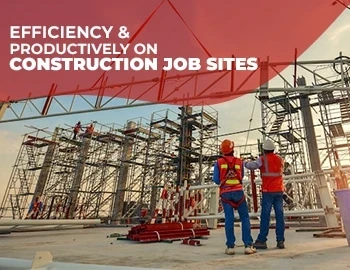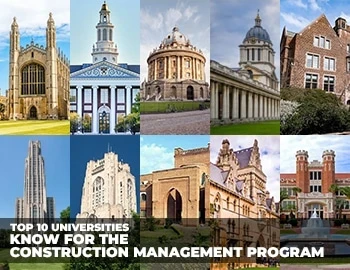Efficiency and Productivity on a Construction Job Site

Efficiency and Productivity on a Construction Job Site
Keeping a jobsite running efficiently and cost-effectively is not always an easy task. One common obstacle is the current shortage of skilled labor in the construction industry, along with an increase in the cost of construction materials. It can be challenging for construction contractors and project managers to complete jobs on time and on budget and to keep customers satisfied. To achieve this, it is essential to equip yourself with the best tools to complete construction projects in the most cost-efficient and productive way possible. Here are a few factors to consider to increase efficiency and productivity on construction sites
- Time management
One way to increase efficiency on construction jobsites is effective time management. Scheduling workers to make sure someone is available to work at any given time to get a project completed in a timely manner can be a challenge. And once the workers are there, you will also need supervisors on site who can lead a team and motivate everyone to work productively.
- Vetting Subcontractors
Construction professionals must be very cautious when hiring subcontractors. Project managers can be held legally liable for any faulty workmanship on a job. All subcontractors hired for a project should be thoroughly vetted, including verifying all references, inspecting documentation such as licenses, employee records, or insurance coverage. Always review the subcontractor’s business model and financial solvency.
- Maintaining Insurance Requirements
Without the proper insurance, construction contractors and project managers are legally responsible if things go wrong on a jobsite. Workers can be injured, jobs can be completed that are not up to quality standards, environmental contamination can occur while completing a project, among other possibilities. All these issues can cause liability issues for contractors. A periodic review of insurance coverage is necessary to ensure projects run efficiently and smoothly and that all parties involved are properly protected.
- Keep Lines of Communication Open
Effective communication is important in letting employees know the expectations of their manager regarding the time scope of completing a project, the materials needed, and in coordinating the efforts of all team members. Without keeping the lines of communication open, a project can quickly get out of control. Everyone must know and understand the tasks needed to complete a job on time and with quality workmanship. Without effective communication, there can be delays that prove costly in time and money.
- Employee motivation
Construction employees expect to be valued and treated fairly, which includes providing a safe working environment, listening to any employee concerns that may arise, and working to find a solution to the problem. When employees feel valued, they will be motivated to perform to the best of their ability. The more productive the employees are, the faster the job can be completed, which will help get the project completed on time and on budget.
Construction contractors have a lot to think about in day-to-day operations, including trying to save on costs. Understanding industry-specific risks and learning how to mitigate them are key to achieve efficiency and productivity on construction jobsites.
Michael DeSafey is a leading executive recruiter for professionals in the construction, engineering and environmental industries. He is currently the President of Webuild Staffing www.webuildstaffing.com . To learn more about Michael or to follow his blog please visit www.michaeldesafey.com
Top 20 Colleges Offering the Best Construction Management Programs

Top 20 Colleges Offering the Best Construction Management Programs
If you are looking to grow your construction business and maintain your core values as you expand your brand, recruiting recent graduates from a top-notch construction management program is makes good sense. New graduates bring to the table their knowledge of the most recent trends and advances in construction science, which can be combined with the hands-on experience of your more senior project managers to increase efficiency and improve your bottom line. As newcomers to the industry, they can be mentored and trained to emulate your core principles and unique business methodology.
Last year, over a hundred colleges across the nation awarded nearly 3,500 construction management degrees: with a 10% growth in the industry, these graduates are in high demand. Average salaries for those entering the job market hovered around $61,000, but graduates from the nation’s top construction management programs can earn upwards of $70,000. If your company is in the market for a new hire, here’s a look at some of the best construction management programs in the United States.
Ranking the Top Five
College Factual, a data collection storehouse providing degree, program, and career information to students, faculty, and institutions, created a ranking of colleges and universities that offered bachelor’s degrees in construction management. Factors in their analysis included percentage of degree completion, student body academic caliber, educational resources, and reported post-collegiate earnings. They also considered factors like number of students applying to the program, accreditation by national accrediting bodies, and percentage of student body enrolled in construction management, as well as the overall quality of the school and student satisfaction. Here is their pick of the top five schools in the nation:
- Arizona State University in Tempe offers bachelor’s, master’s, and doctorates in construction management. In 2018, their 81 bachelor’s graduates accepted national and international positions at an average salary of $70,000. ASU is ranked the #1 college in Arizona and #3 on College Factual’s list of Best Value Colleges for Construction Management.
- Wentworth Institute of Technology in Boston, MA, is a small private school that offers degrees in construction management at the bachelor’s and master’s level. In 2018, this small school awarded 98 bachelor’s degrees and 22 master’s degrees. Recent graduates report starting salaries at just under $78,000. Wentworth Institute is ranked as the #1 Construction Management Colleges for Non-Traditional Students and the #2 School for Veterans.
- Virginia Tech in Blacksburg, VA, is a large school with a relatively small construction management program. It offers both a bachelor’s and a master’s degree and awarded 76 bachelor’s degrees in 2018 —a 38% growth rate in this up-and-coming program. Their graduates report starting salaries averaging $64,000. They are ranked as the #1 college in Virginia and #3 for Best Construction Management Colleges for Non-Traditional Students.
- University of Oklahoma Norman Campus is a large public school offering bachelor’s and master’s degrees in construction management. In 2018, they awarded 20 bachelor’s degrees and 12 master’s degrees. New graduate salaries were not available.
- Louisiana State University and Agricultural & Mechanical College in Baton Rouge, LA, is a large urban college offering both bachelor’s and master’s degrees in construction management. In 2018, they handed out 161 bachelor’s degrees to graduates who reported an average starting salary of $65,000. This university awarded more construction management degrees than any other program in the country and was rated #6 in Best Construction Management Colleges for Non-Traditional Students.
The Runners-Up
Not everyone can be at the top! The following colleges and universities are also highly ranked and well-regarded for their construction management programs:
- Clemson University in Clemson, SC
- Brigham-Young University in Provo, UT
- Milwaukee School of Engineering in Milwaukee, WI
- John Brown University in Siloam Springs, AZ
- Washington State University in Pullman, WA
- Lawrence Technological University in Southfield. MI
- Appalachian State University in Boone, NC
- Norwich University in Northfield, VT
- Boise State University in Boise, ID
- North Dakota State University in Fargo, ND
- Drexel University in Philadelphia, PA
- The University of Northern Iowa in Cedar Falls, IA
- Pittsburg State University in Pittsburg, KS
- The University of Alaska at Anchorage, AK
- The University of Texas at Tyler, TX
Michael DeSafey is a leading executive recruiter for professionals in the construction, engineering and environmental industries. He is currently the President of Webuild Staffing www.webuildstaffing.com . To learn more about Michael or to follow his blog please visit www.michaeldesafey.com
Category: Career Training, Construction, Jobs
Top 10 US Universities Known For Their Construction Management Programs

Top 10 US Universities Known For Their Construction Management Programs
If you are looking to obtain a degree in a growing field, majoring in construction management would be a great decision. Construction management careers are expected to grow by 11.1% between 2016 and 2026, with a projected 448,600 jobs made available during this time frame. At $62,200 on average, the starting salary for a construction management career in the United States is attractive as well.
Ultimately, obtaining a degree in construction management can open many doors. Graduates can venture into many sectors, from drafter to electrician, to architect, to property or construction manager. The opportunities are nearly endless, and the job growth looks promising within the industry.
In 2019, approximately 3,375 construction management degrees were awarded to students around the United States, in many concentration areas that apply to a wide variety of positions. If you think that a construction management degree might be the right move for your career, see below the top 10 construction management programs offered in the United States.
California State University in Sacramento is a public university that offers a 132-hour cooperative construction management program, meaning you will gain real work experience before graduating. Tuition: $9,127.
Arizona State University in Tempe is a public research institution that offers construction management programs with four emphasis options: commercial building, specialty construction, concrete industry, and residential construction. Tuition: $13,007.
Purdue University is a public research institution in West Lafayette, Indiana. Its construction management program places a heavy emphasis on the importance of work experience and the degree’s business side. Tuition: $11,693.
Central Connecticut State University is a public university is based in New Britain, Connecticut. Its construction management program is a blend of field operations and advanced mathematics. Tuition: $14,852.
New York University is a research university located in the heart of New York City. With this program, you will have the opportunity to gain field experience at actual construction plots in the city. Tuition: $35,147.
Minnesota State University in Mankato offers both online and on-campus course options. Its construction management program provides every student with the opportunity to partake in a construction field internship before graduation. Tuition: $13,812.
Brigham Young University in Provo provides a construction management program that blends field experience with construction-related coursework. Tuition: $12,864.
Wentworth Institute of Technology is a trade school that offers 17 different bachelor’s degrees, all rooted in the STEM fields. This construction management program provides hands-on construction experience from day one. Tuition: $36,579.
Louisiana State University and Agricultural & Mechanical College is based in Baton Rouge, Louisiana. Its construction management program is heavily focused on the business side of the degree, offering core classes based on analytics, geometry, and finance. Tuition: $15,095.
California State University in East Bay offers an excellent construction management program that focuses heavily on the engineering aspect of construction management. Tuition: $10,758.
All these schools present a great construction management program with its own set of pros and cons. Visit each school’s website to learn more about their offer and to discover which school would best suit your career goals.
Michael DeSafey is a leading executive recruiter for professionals in the construction, engineering and environmental industries. He is currently the President of Webuild Staffing www.webuildstaffing.com . To learn more about Michael or to follow his blog please visit www.michaeldesafey.com
Category: Career Training, Construction, Recruiting
How to Become a Certified Project Management Professional

How to Become a Certified Project Management Professional
It is predicted that employers will need 2.2 million more project-oriented professionals each year through to 2027. The globally recognized Project Management Professional (PMP) certification is the leading designation for project professionals across various industries, including engineering and construction. The letters “PMP” affixed to your name signal to potential employers that you have the education, experience, and training to successfully lead a project. The certification is offered by the Project Management Institute (PMI), an association for project, program, and portfolio management professionals around the world.
Are you interested in obtaining your PMP designation? Here are the steps involved in securing this coveted certification.
Background Qualifications
To begin, you’ll need a four-year college degree, an associate’s degree, or a high school diploma. If you have a four-year degree, you will need 36 months of experience leading projects, plus 35 hours of project management training. If you have either a high school diploma or an associate’s degree, you’ll need more on-the-job experience —specifically, 60 months— and 35 hours of project management training. These 35 hours may be obtained from a variety of sources and can be in real time or self-paced. Depending on the provider you select, training typically costs around one thousand dollars. It’s worth talking to your employer before you sign up for training, to determine if they will sponsor you and pay for this portion of your certification preparation.
Application Process
Once you’ve completed the educational requirements, it’s time to gather your documentation and apply to sit for the exam. You’ll need a record of where you’ve worked, the projects you’ve worked on, and the hours associated with each project. You’ll also need proof that you’ve completed your required 35 hours of training. The application fee is currently $405 for PMI members and $555 for non-members. PMI membership is $129 annually, so you should strongly consider joining the association before paying the application fee. Be thorough and honest in all steps, as applications are randomly audited and you never know if yours might be selected for a closer look.
Acing the Exam
From the date you receive word that you are approved to sit for the exam, you have one year to take it. You’ll need to schedule a time to take it live at a testing center or online. The exam consists of 200 multiple-choice questions and requires deep knowledge of the five domains of project management as defined by the PMP Examination Content Outline and A Guide to the Project Management Body of Knowledge (PMBOK Guide). Careful preparation is key, with the average PMP candidate spending 35 hours or more studying for the exam. If you do not pass on your first try, you are allowed to retake the exam up to two more times in your approval year.
Maintaining Your Certification
Once you’ve passed your exam, your newly minted PMP certification lasts three years. You are required to earn and report 60 professional development units (PDUs) within this cycle, and in every three-year cycle thereafter. If you do not complete 60 PDUs in a cycle, your designation will expire, and you will have to begin the application process again and retake the exam.
The PMP designation demonstrates to employers that you are serious about your training and up to date in your project management knowledge. By taking the time to work through the steps outlined above, you will likely be recruited more easily and be able to command a higher salary than similar candidates without the certification.
Michael DeSafey is a leading executive recruiter for professionals in the construction, engineering and environmental industries. He is currently the President of Webuild Staffing www.webuildstaffing.com . To learn more about Michael or to follow his blog please visit www.michaeldesafey.com
Category: Career Training, Construction, Jobs
Twelve Tips for Effectively Running a Construction Management Business

Twelve Tips for Effectively Running a Construction Management Business
Running a construction business can be a stressful experience. There are ways to alleviate some of that stress, primarily by staying organized to give yourself the confidence that you are managing to the best of your ability. Start by following our 12 tips below!
- Establish Clear Project Specifications
Outline parameters including company, objectives, budgets, scope, time, reporting, materials, employees, and deadlines.
- Create a Strong and Engaged Team
Align workers’ skills with appropriate placement and make sure they understand their roles and responsibilities. Help workers see how their contribution affects the end goal. Your team’s dedication and efforts will make the difference between a project that is a failure or a success. Put milestones and deadlines on a calendar and schedule regular meetings. Deal with issues as they come; don’t brush them off for later. Celebrate achievements and reward team members.
- Break Down Complex Problems
Whatever the issue, make it more comfortable to deal with by breaking it down into measurable and manageable pieces that can be assigned to different team members.
- Invest in a Construction Project Management Software (CPM)
Monday.com, Knowify, Corecon, CoConstruct, and Wrike are all excellent examples of CPMs. They can help you:
- Choose objectives and plan accordingly
- Maximize efficiency
- Automate administrative tasks
- Simplify estimates and billing
- Schedule jobs
- Manage workload assignments
- Keep Track of Bids and Actual Work
Keep track not only of what you do, but also of the jobs you initially bid for and did not end up doing.
- Establish Key Performance Indicators (KPIs)
Your KPIs will help you see where you are on a project compared to where you need to be, and will help you know where improvements are required from you or other team members.
- Keep Communication Open
The construction manager must constantly communicate with workers, executives, clients, and prospects. Active and frequent communication helps the business run more smoothly, and everyone will know what is going on.
- Stay on Schedule
You can do this by using your project management software, delegating tasks, allocating resources appropriately, and improving efficiency and productivity on site. If you need to keep up with the demand or get ahead, have your workers start early and leave later than expected.
- Stay Alert
Be aware and alert with your team and with the resources you have available.
- Document All Activity and Use Daily Reports
This practice will ensure that in case of overtime or when the work lasts longer than expected, your workers are still getting paid their fair share. You will also have this information at your fingertips for reference if anyone has a question. Daily reports, which should include cost to complete, percent of efficiency, hours lost, and timecards, will help you keep everything organized and should be a part of your project management folder.
- Market Your Company
Marketing your company takes straightforward steps:
- Sponsor seminars in your area
- Write articles
- Redesign your website
- Frequently stay in touch with prospects and clients
- Maintain an Up-to-Date Strategic Business Plan
Your business plan should include:
- Five-year vision
- Company mission
- Core values
- Defined goals
- Action plan for improvement
- Well-defined business strategy
- Strategic planning sessions
These tips and strategies won’t guarantee you won’t make any mistakes; you can’t stop every problem from arising, and every business has its difficulties. But if you follow them, they can prepare you to face anything that comes your way with confidence.
Michael DeSafey is a leading executive recruiter for professionals in the construction, engineering and environmental industries. He is currently the President of Webuild Staffing www.webuildstaffing.com . To learn more about Michael or to follow his blog please visit www.michaeldesafey.com
Job Success Tips For Upcoming Engineering & Construction…

Job Success Tips For Upcoming Engineering And Construction Management Graduates
At the top of that mountain of work you did to earn your degree, you can see a world of possibilities. You may not yet know what you’re capable of but you’ve gained some confidence in your abilities and you’re ready to seek out your first independent job with the title you worked hard to achieve. What skills should you ensure stand out on your resume? What are construction management and engineering employers looking for when they’re choosing someone to hire? There is no guaranteed formula that works for every single employer but there are a few tips that can help you stand out in your field and get the job you hope for.
Exhibit Your Initiative
It’s one thing to say that you’re a “self-starter” but most employers have heard this before from recent graduates. On your resume, make sure that your previous work experience or your experience at college has some point that shows your leadership skills and ability to take initiative. For instance, if you led a successful project or initiated an idea on your own this would be an effective display of your skill as a self-starter. The major point is that saying isn’t enough. You have to prove it!
Stay the Course
An important aspect of the job for construction managers and engineers is to be able to see it through from start to finish. If you’re new to the field, employers won’t yet know that you’re trustworthy in this aspect. Testimonials from previous clients and references from past employers are good ways to show that you are trustworthy but another way you can stand out is to show that you have ideas about the project for its beginning and its end. If you’re hoping to get hired, any project manager or engineer can show how they’ll start a project but if you show how you might finish it and interesting points that you can contribute throughout the project, it is indicative of your intention to stay with the project from inception to completion.
Communication and Flexibility
The logistics have to do with your competency and showing that you can carry out the necessary skills to do the job. Communication is another story. If you’re hoping to stand out with a particular job, find out the details of what the client is looking for. Take a look at previous projects and what you can find out about the current project. Do your best to get to know the client before you ever even meet them for the first time. Check social media, websites, and if possible, visit places that were built by this client. Learn what they’ve done and why so that you have something to say that shows you’ve done your homework. Not only does this show the client that you’re willing to do a little extra but it also shows that you’re serious about working with them. You’ll have to communicate with this client throughout the project and understand its scope in order to be the construction manager or engineer. You can’t do that if you don’t know anything about them and that will become apparent a few minutes into your first conversation with them.
Own Your Mistakes
You might think that any blemish on your resume or in your work history is something that you must stay away from at all costs. But you can make these past mistakes work in your favor by showing how you overcame them. If you can show that you can handle problems when they arise, this is a great way to stand out as a construction manager or engineer. Many candidates will do whatever they can to prove their worth and that’s also important but if you can prove that you know how to smooth out the bumps in the road instead of letting them stop you, then your value will increase. Every person on your project and every circumstance is unique. Clients change their minds and people (including you) make mistakes. Show that you can handle this and make it work for you and you will be unstoppable.
Michael DeSafey is a leading executive recruiter for professionals in the construction, engineering and environmental industries. He is currently the President of Webuild Staffing www.webuildstaffing.com . To learn more about Michael or to follow his blog please visit www.michaeldesafey.com
3 Key Skills Needed to Advance in Construction Management

3 Key Skills Needed to Advance in Construction Management
Construction managers are in high demand–and it’s a great position that you’ve had your eye on for quite some time. When you’re interested in this critical promotion, however, you want to make sure that you have the skills you’ll need for your new job. These three key skills will help you advance in construction management and acquire the job of your dreams.
Organization Skills
Construction Management Skills Career Advancement
As a project manager, you’ll need to keep your project running smoothly–and that means staying organized. If you struggle to locate your tools at the end of the day or you never know what you’re going to be doing until you arrive at the job site each day, your
organization skills need some work before you can advance to construction management. Work on staying aware of what’s going on around you and keeping track of your own equipment. Develop strategies for keeping your truck organized. Starting with personal organization is a great way to increase your ability to organize larger projects.
- Problem Solving Skills
As a project manager, you’ll be responsible for managing the problems that crop up in every project. There’s no passing it off to someone else now; you’re the one who needs to come up with a solution! Start with the problems you see on construction sites now. Do you see a potential solution? Present it to your current project manager along with the issue. They’ll appreciate the initiative, and you’ll be gaining valuable new skills.
- People Skills
Project managers don’t have the luxury of just working with their hands. You’ll need to get to know the people around you: learning their strengths and weaknesses, understanding what combinations of workers fit well together, and understanding what’s needed in order to motivate specific employees. Start small as you learn how to interact with other members of your team–especially the ones that you don’t like. Develop your negotiation skills. As a project manager, your interactions with people are more important than anything else on the site!
Moving on to project management is an important step–and it’s one that, in many cases, has little to do with your skills as a contractor. By developing these three key skill sets, you’ll discover that you’re in a much better position to attain this type of promotion. Start developing your professional skills today to acquire the job you’ve always dreamed of.
Michael DeSafey is a leading executive recruiter for professionals in the construction, engineering and environmental industries. He is currently the President of Webuild Staffing www.webuildstaffing.com . To learn more about Michael or to follow his blog please visit www.michaeldesafey.com
